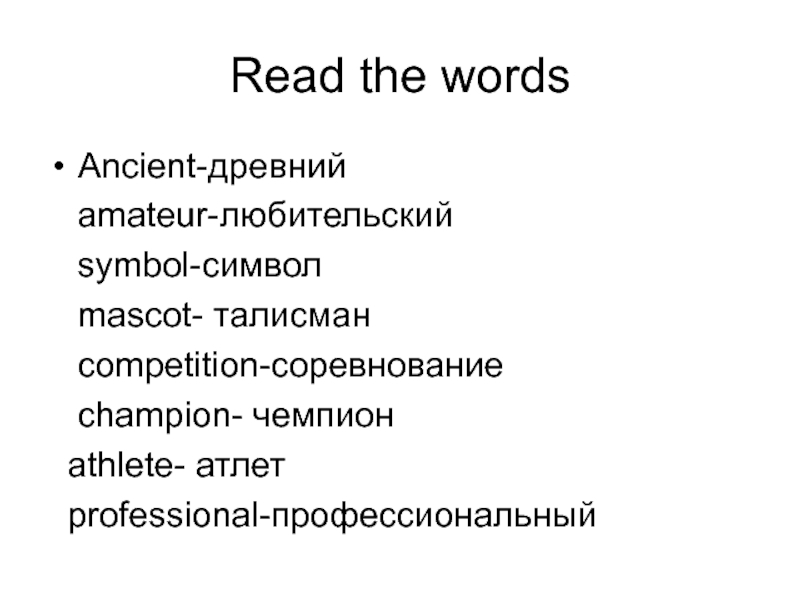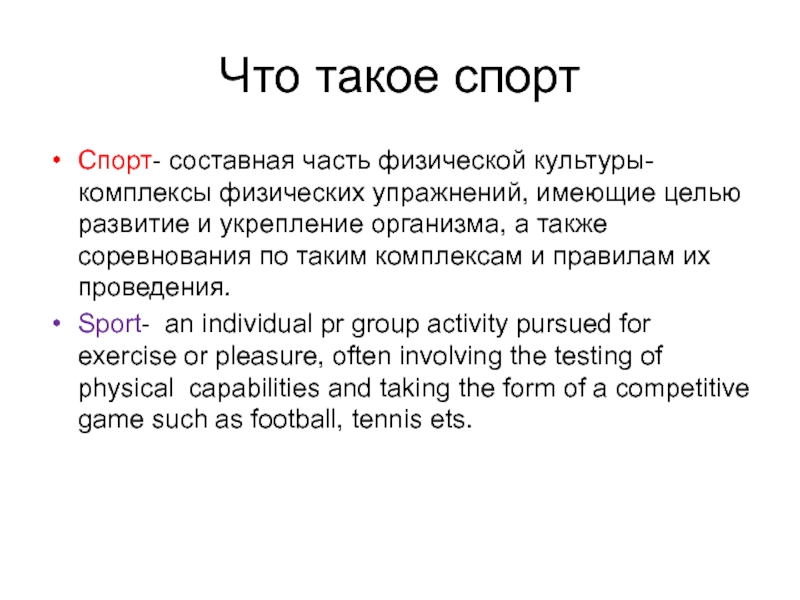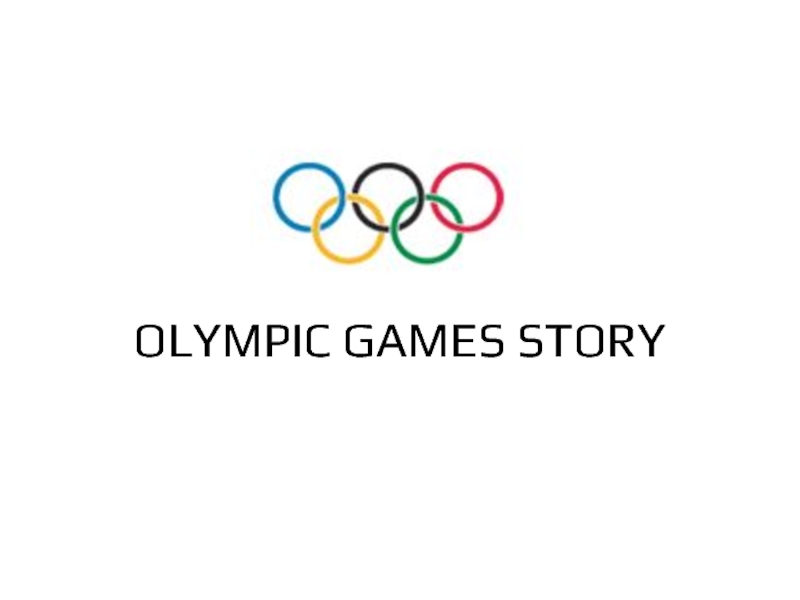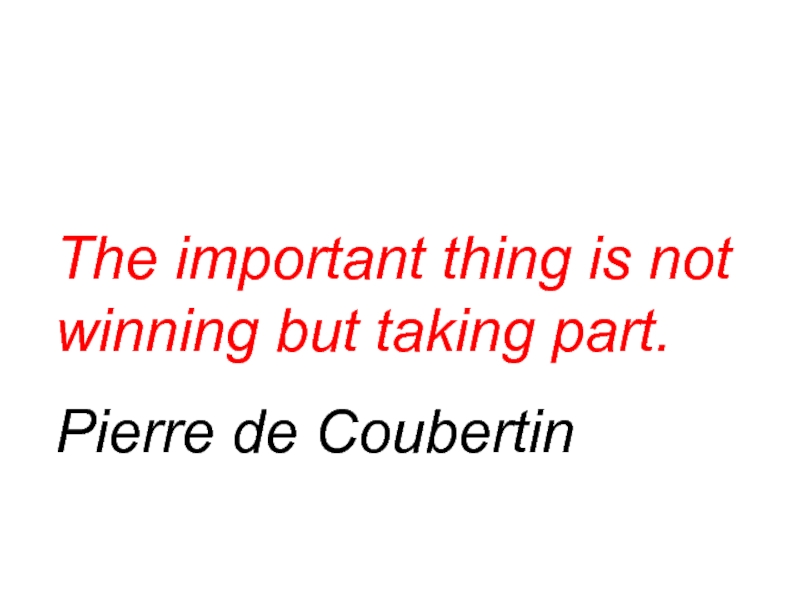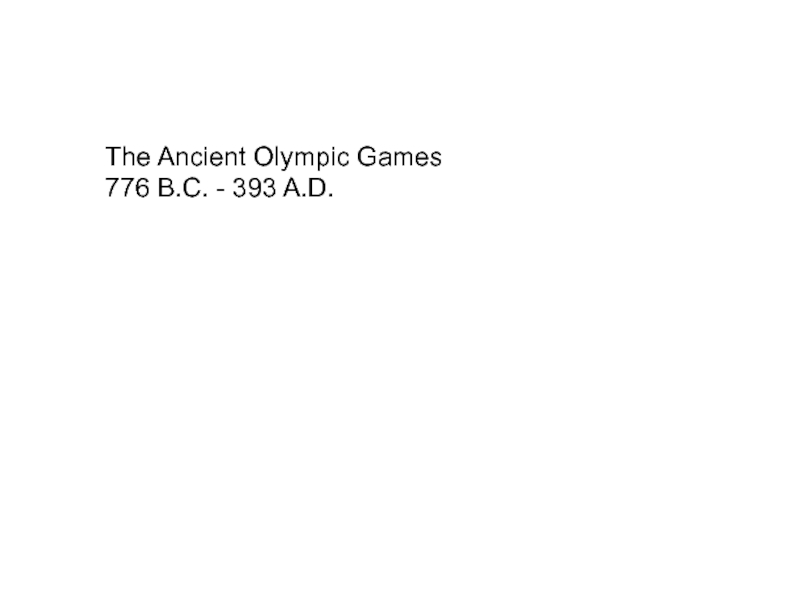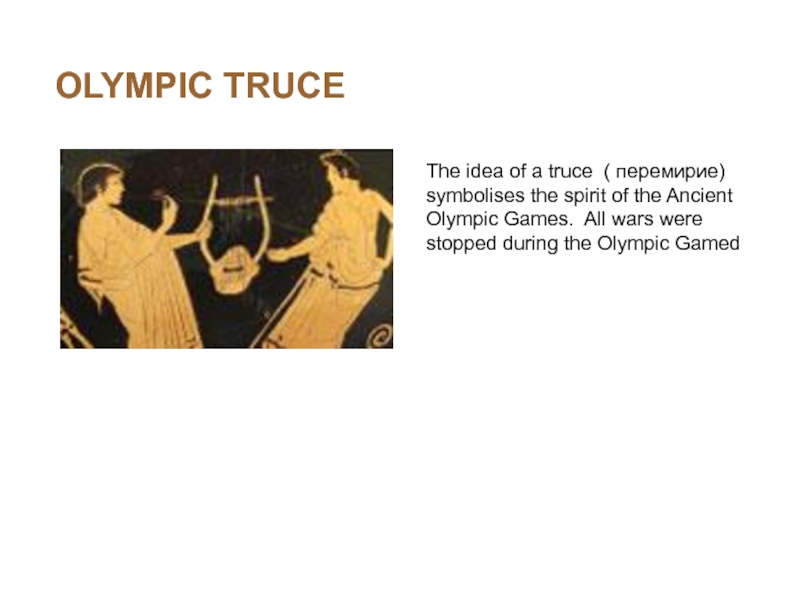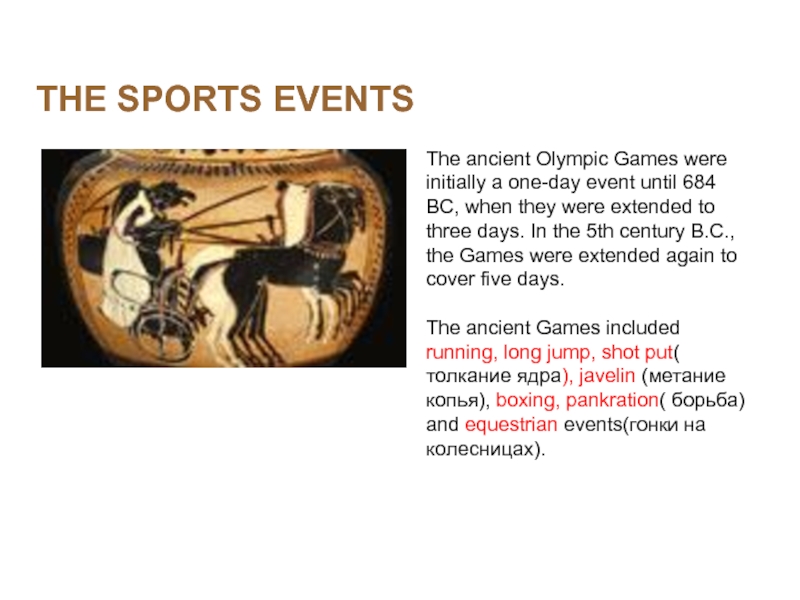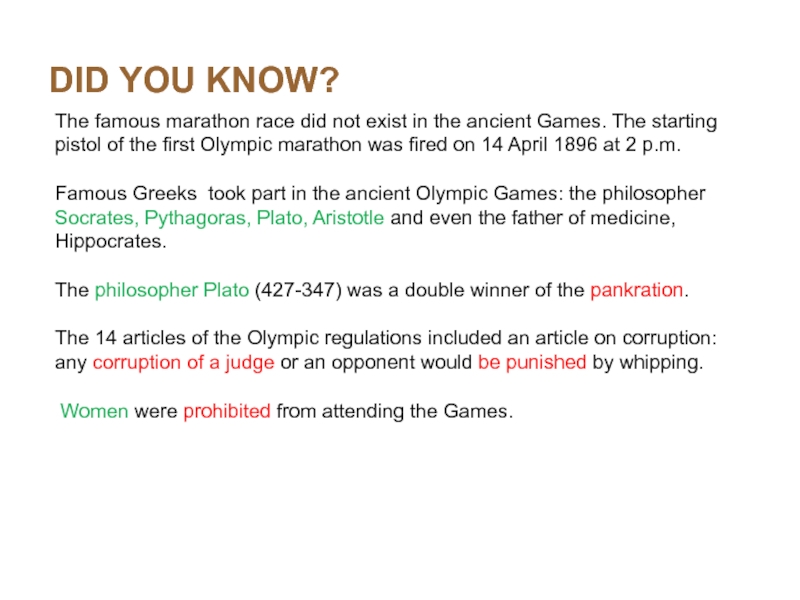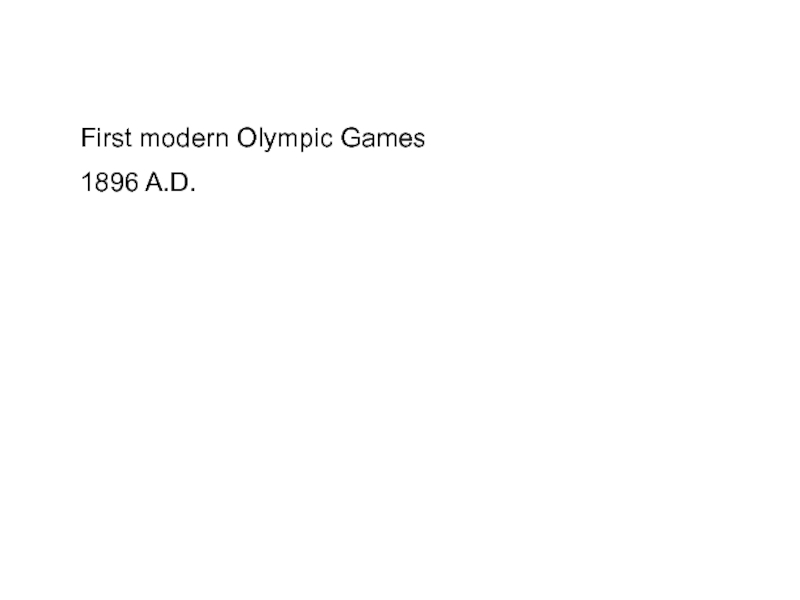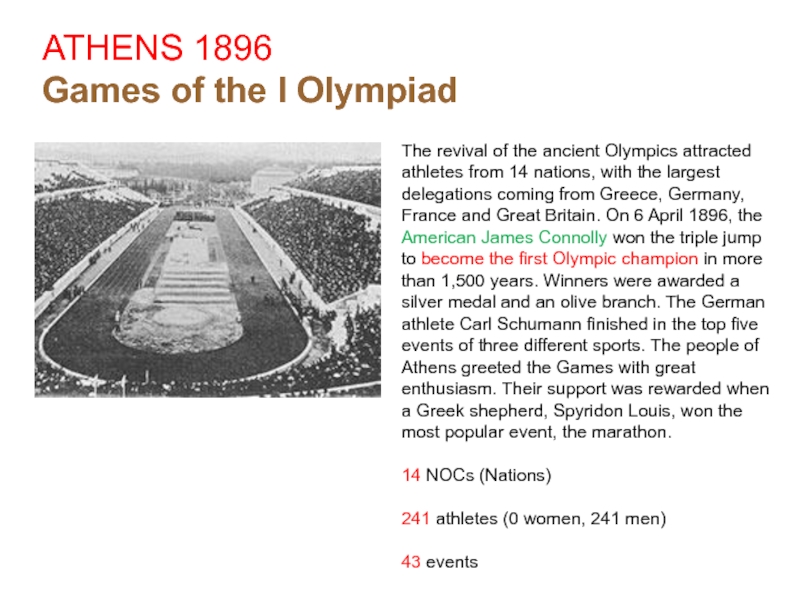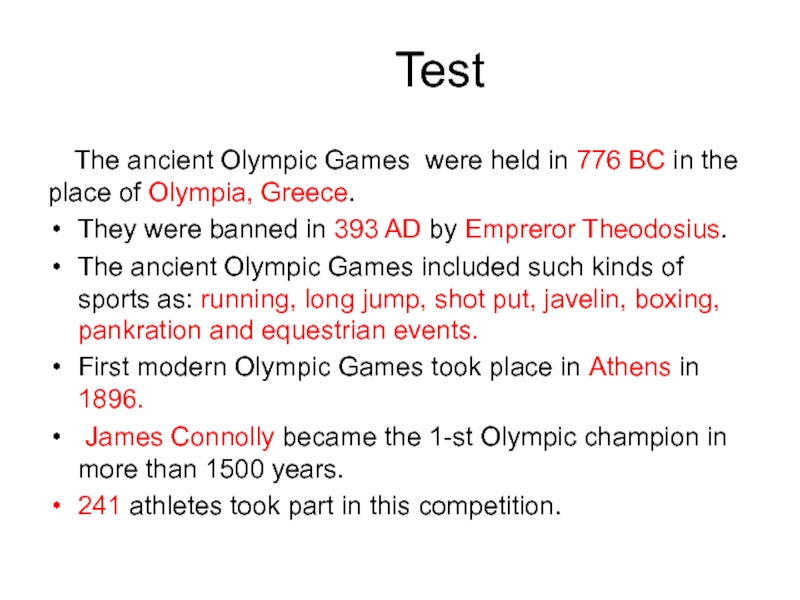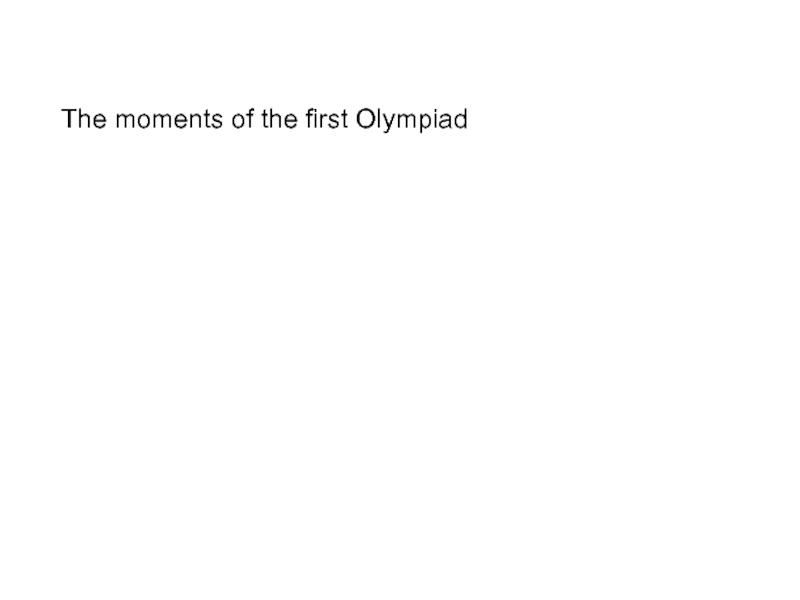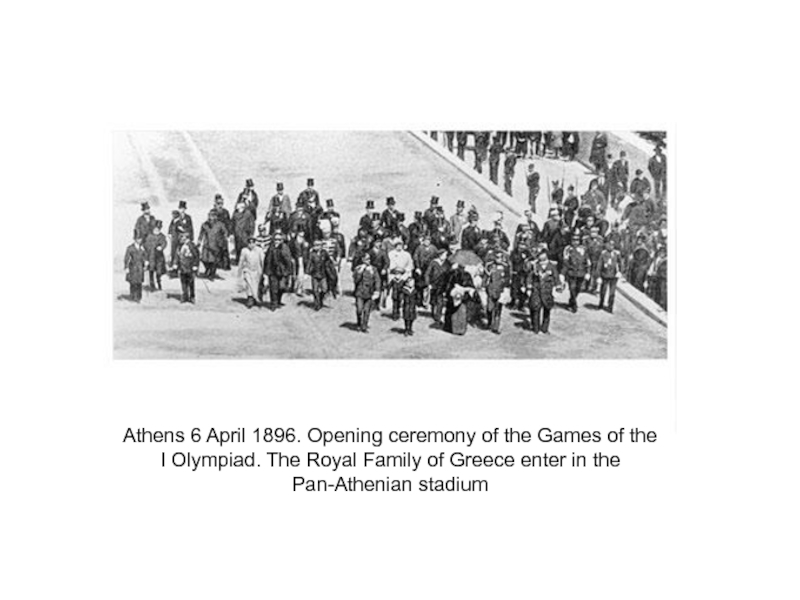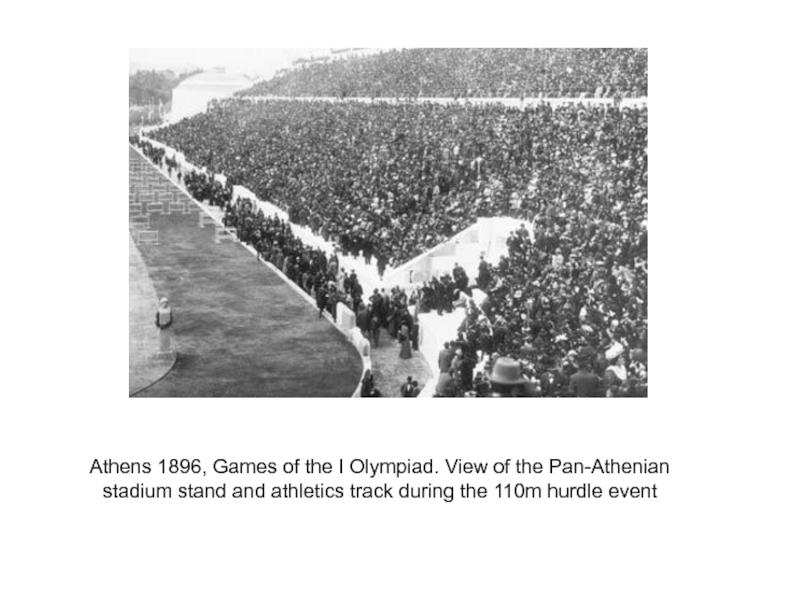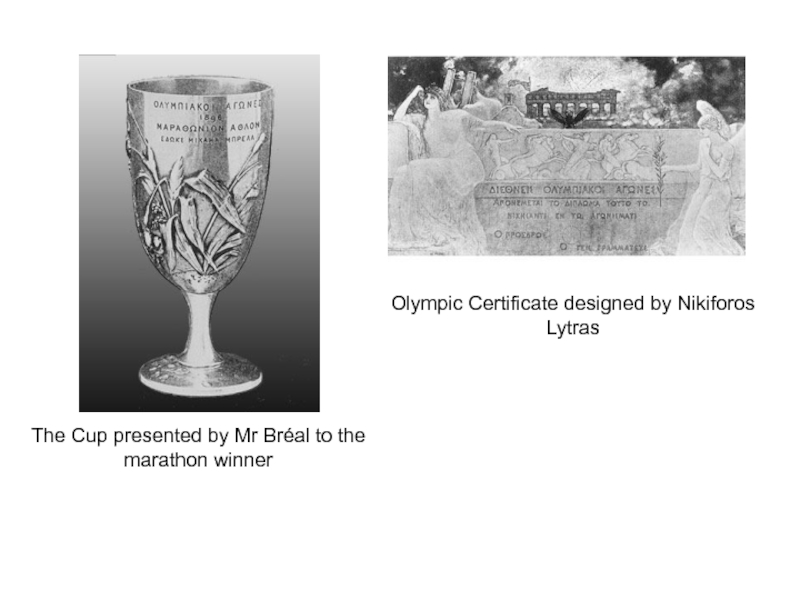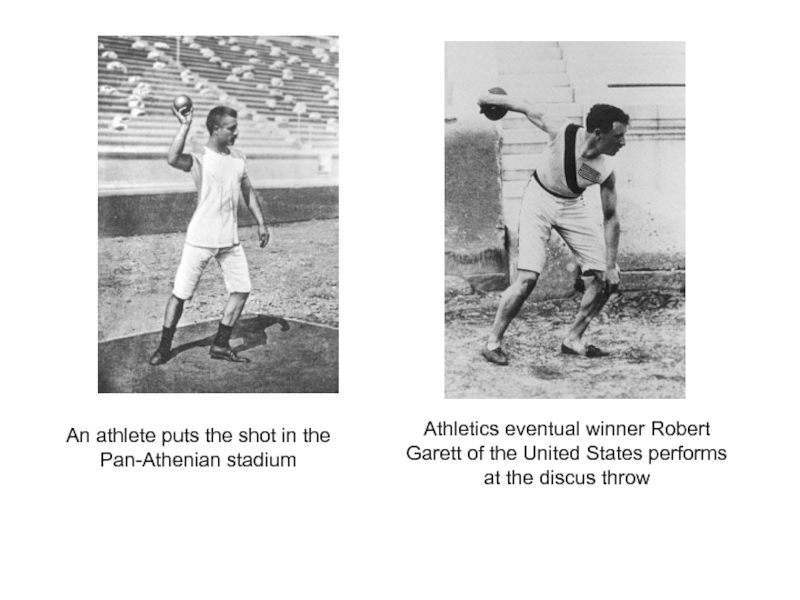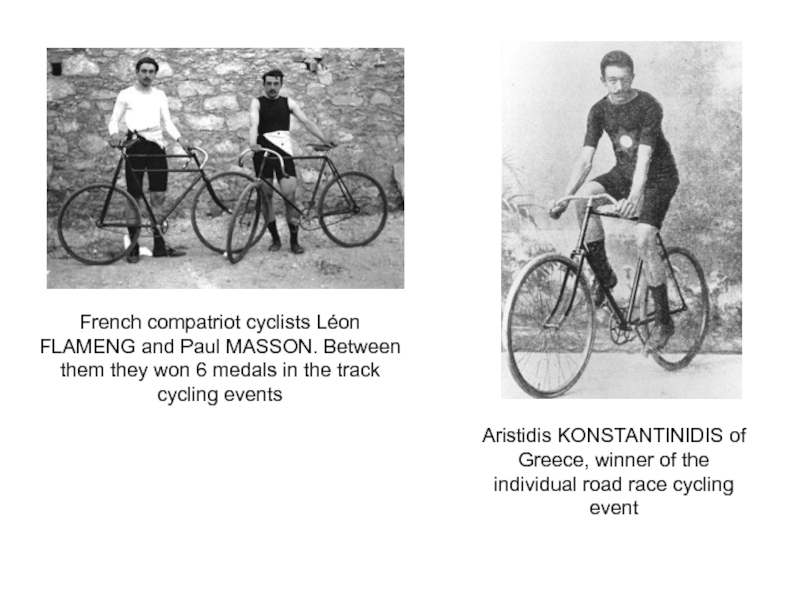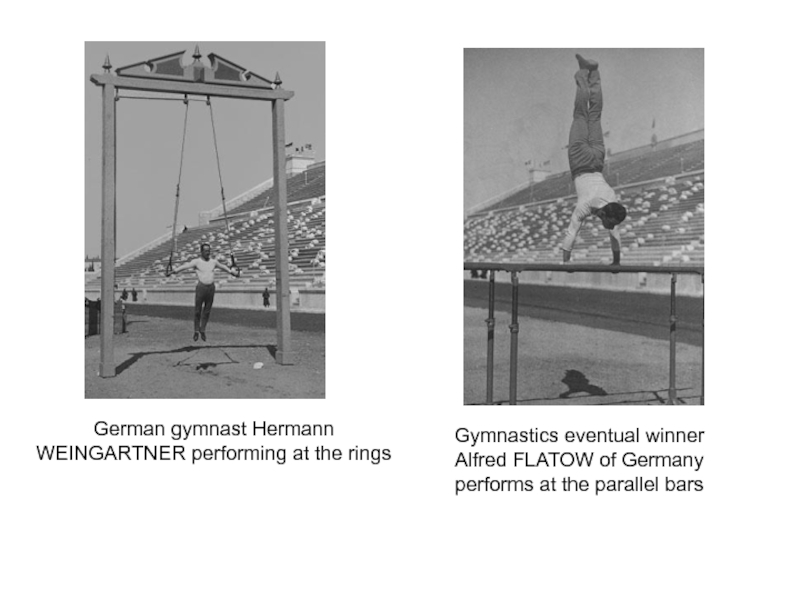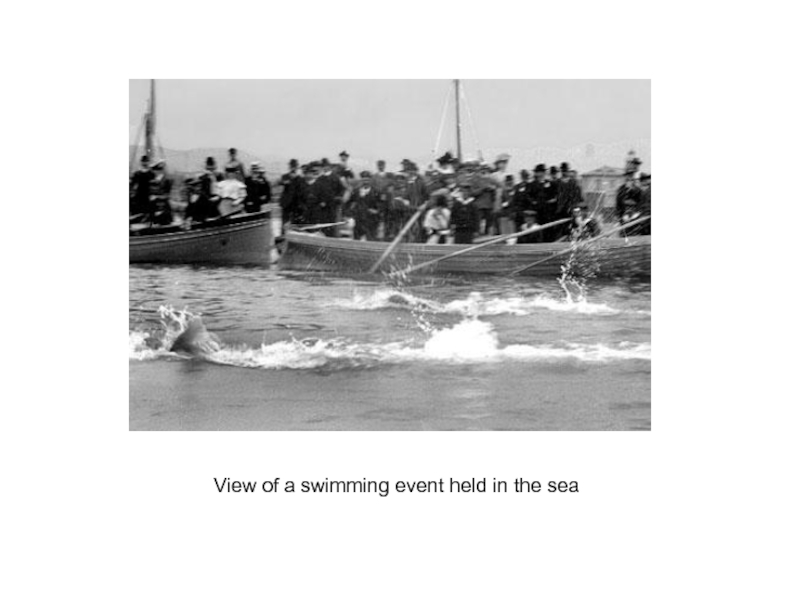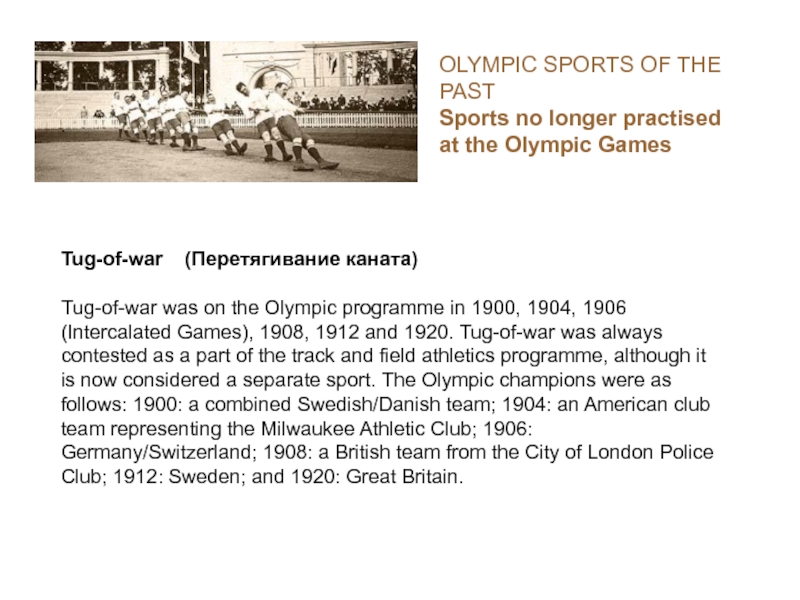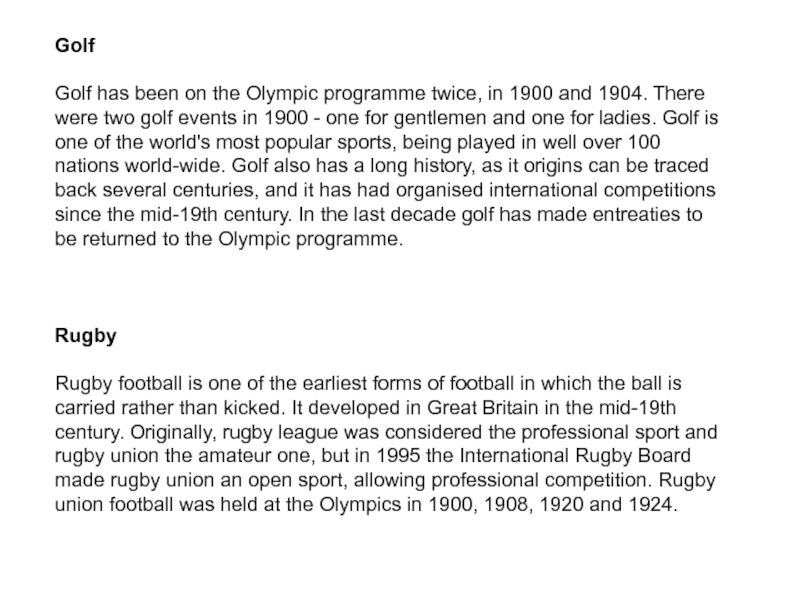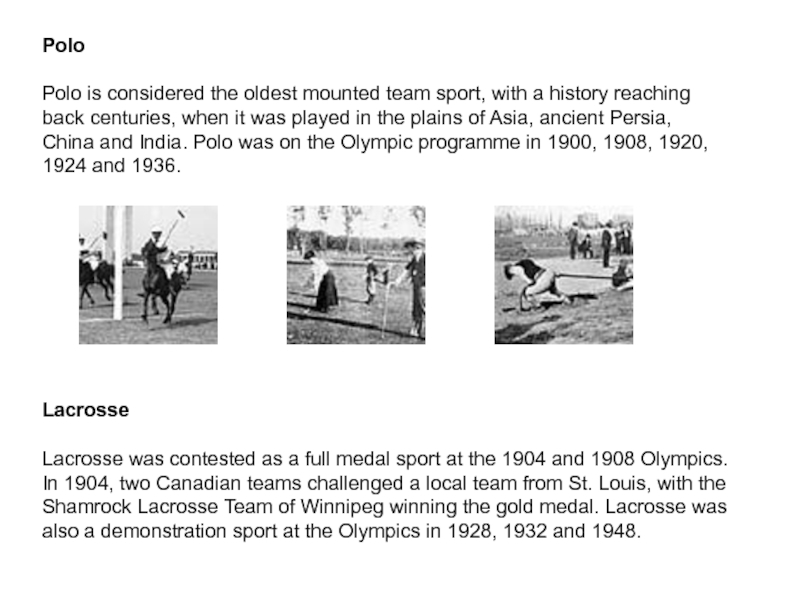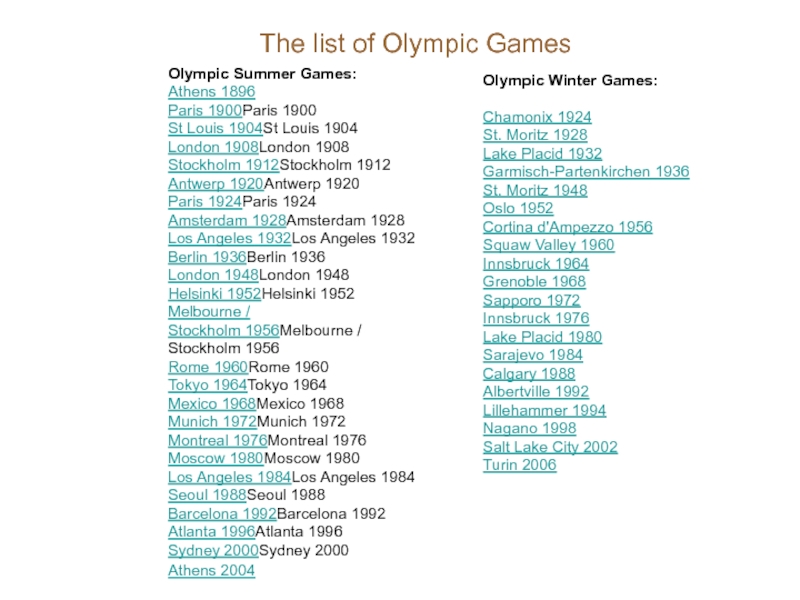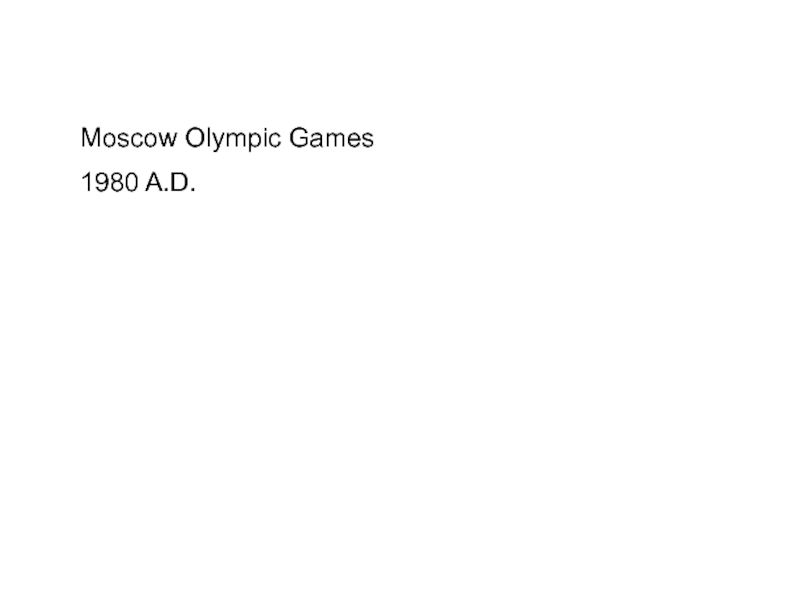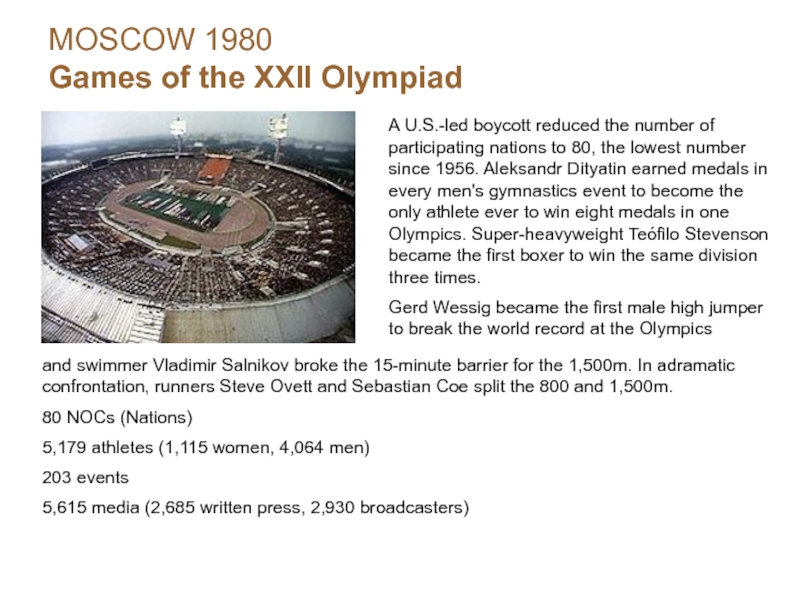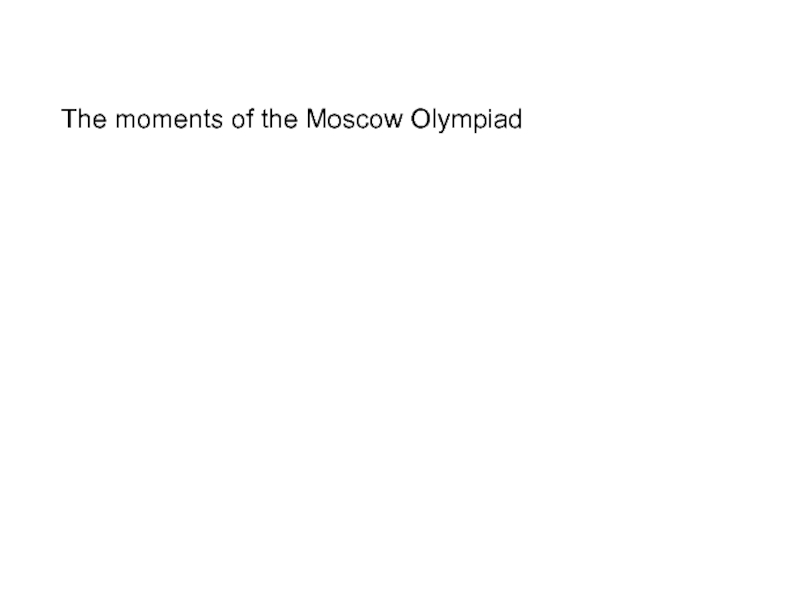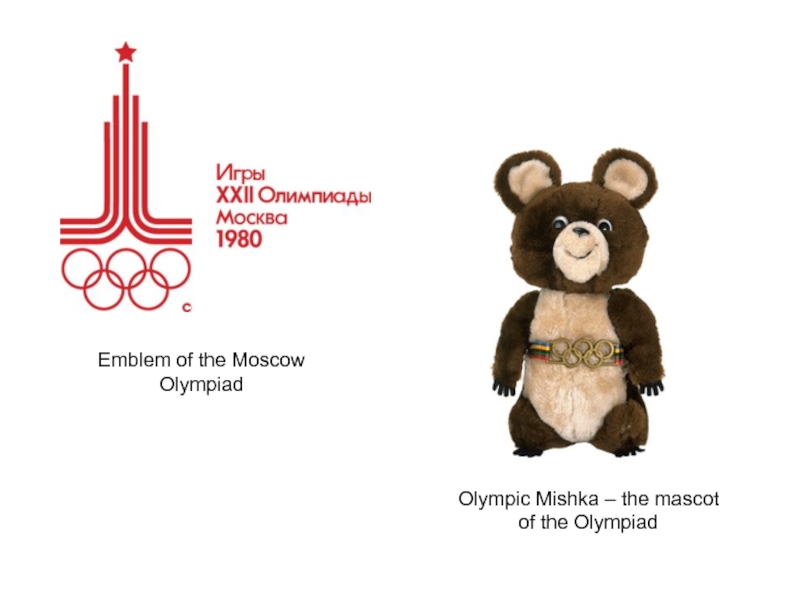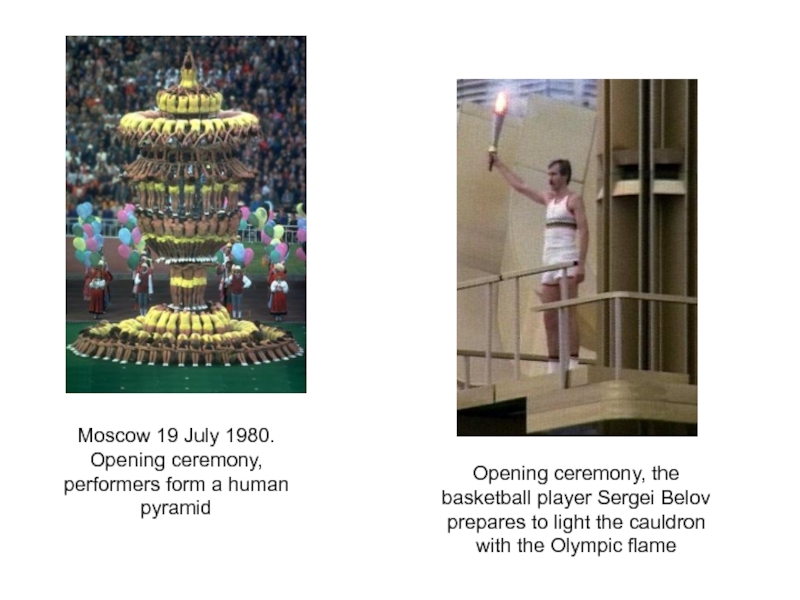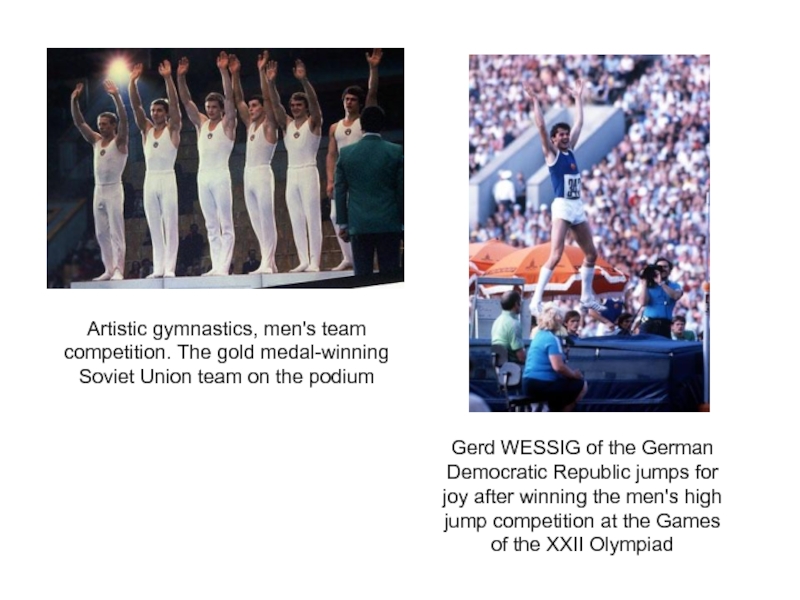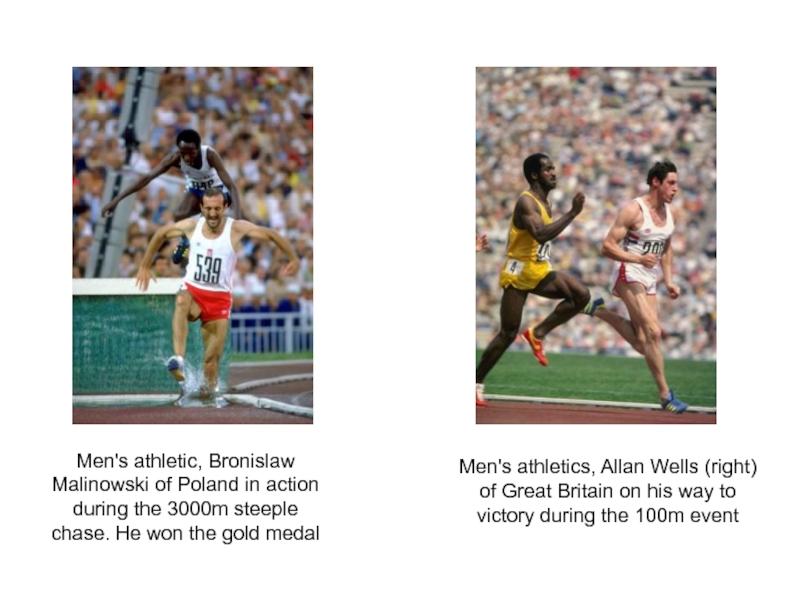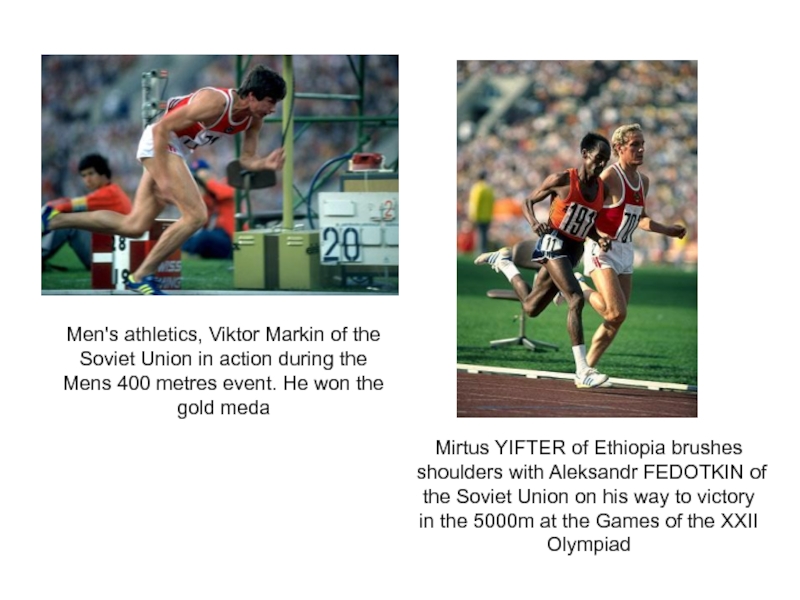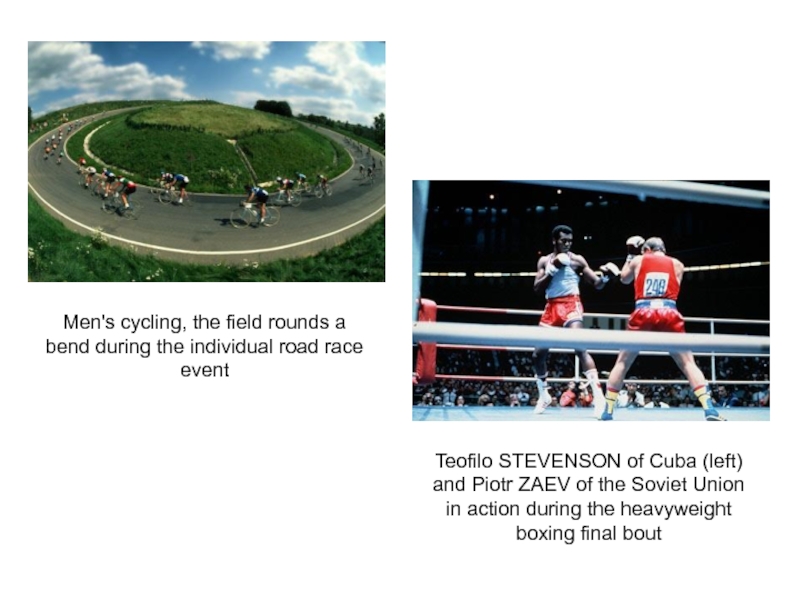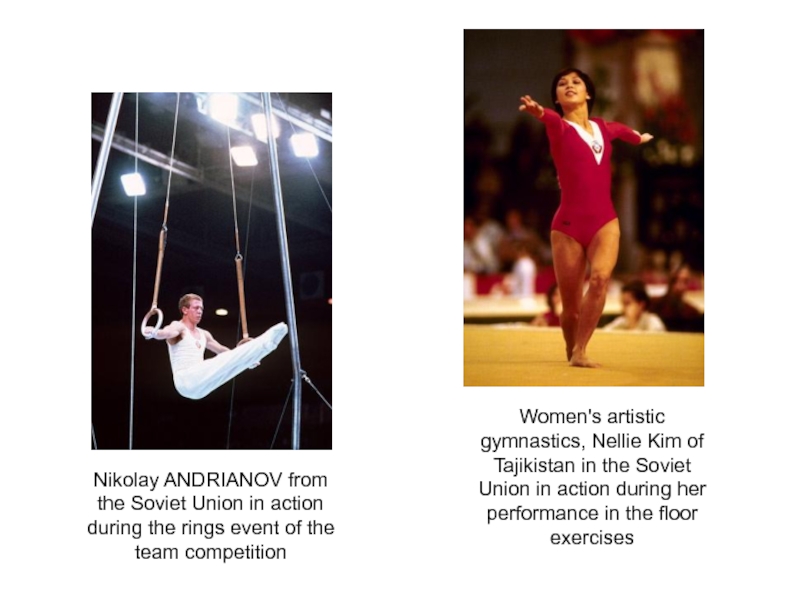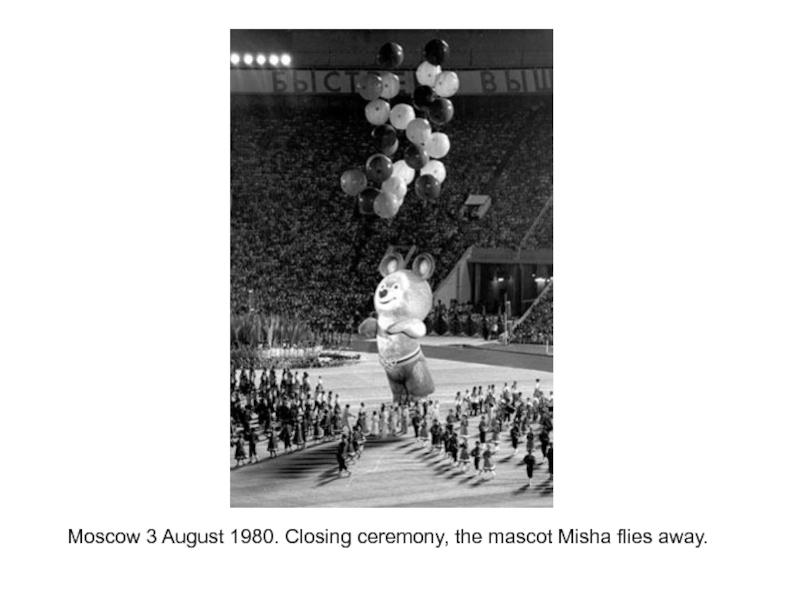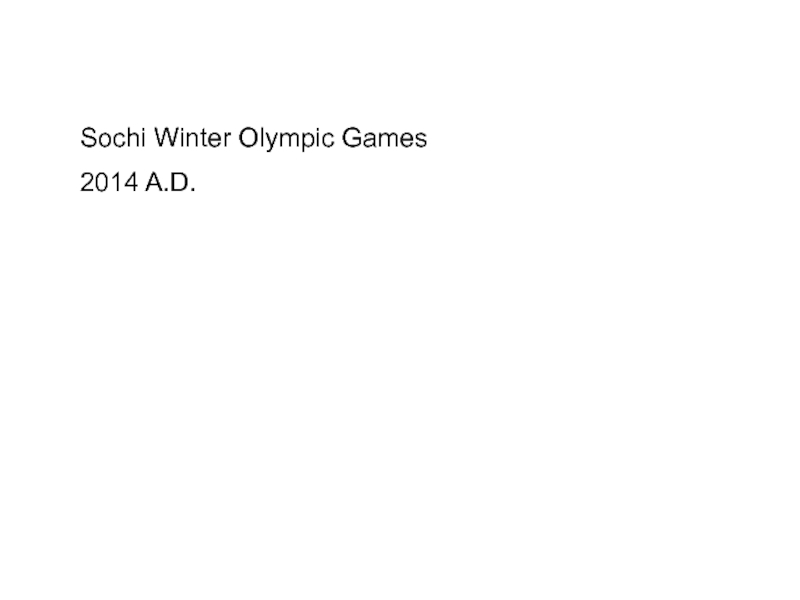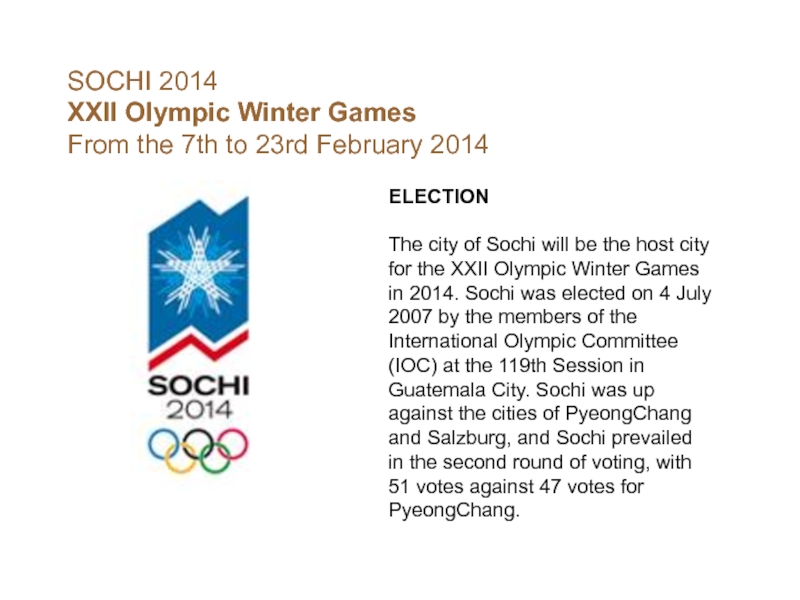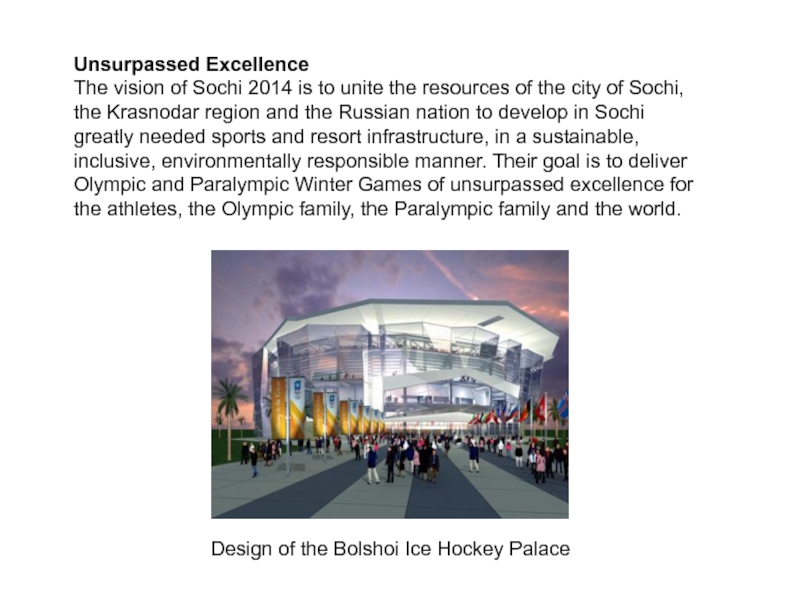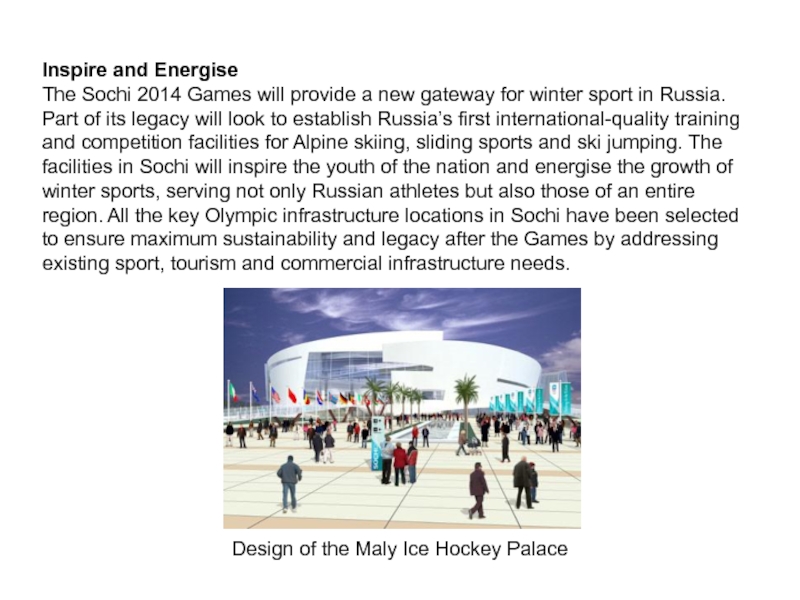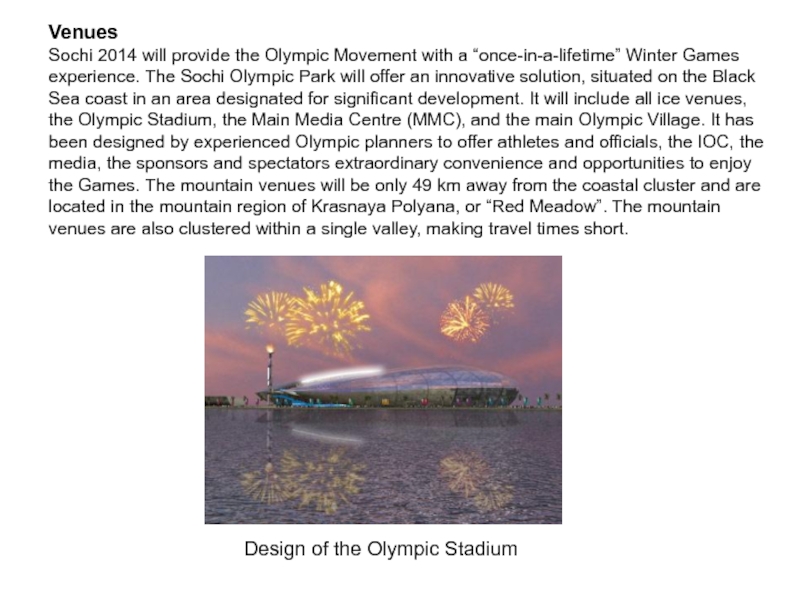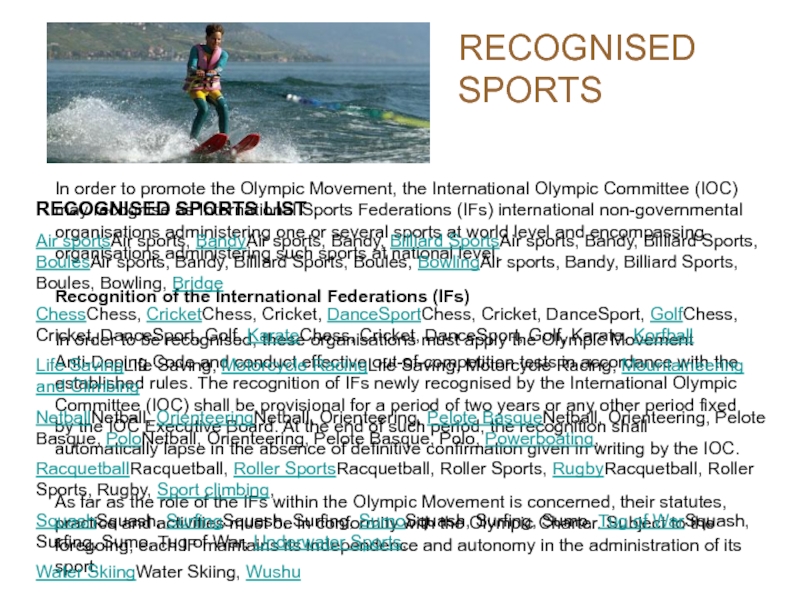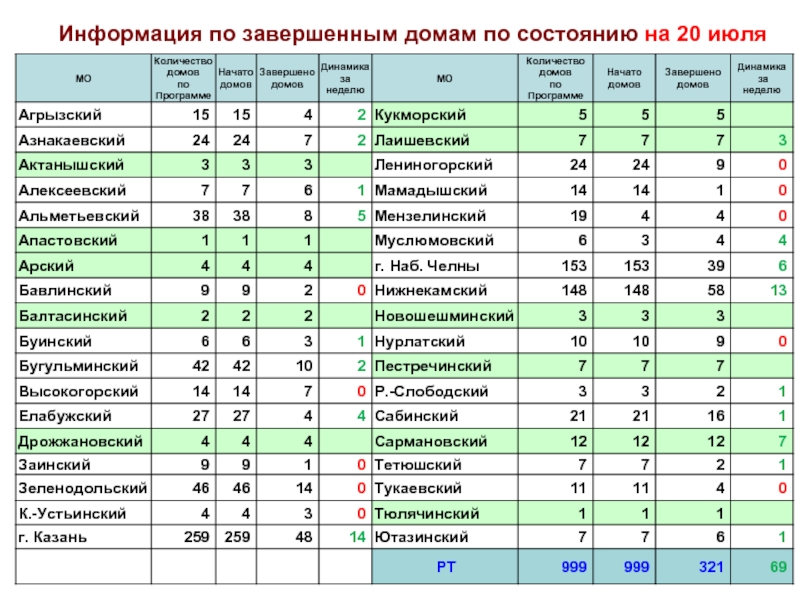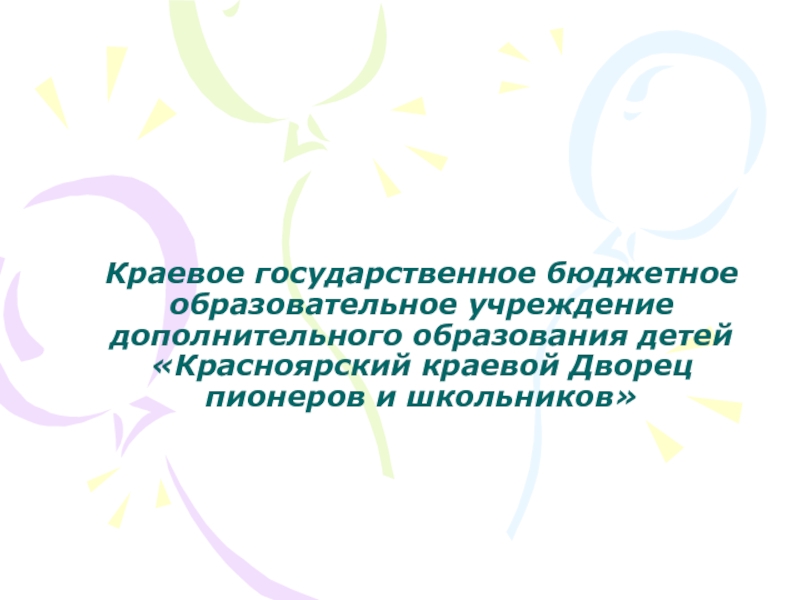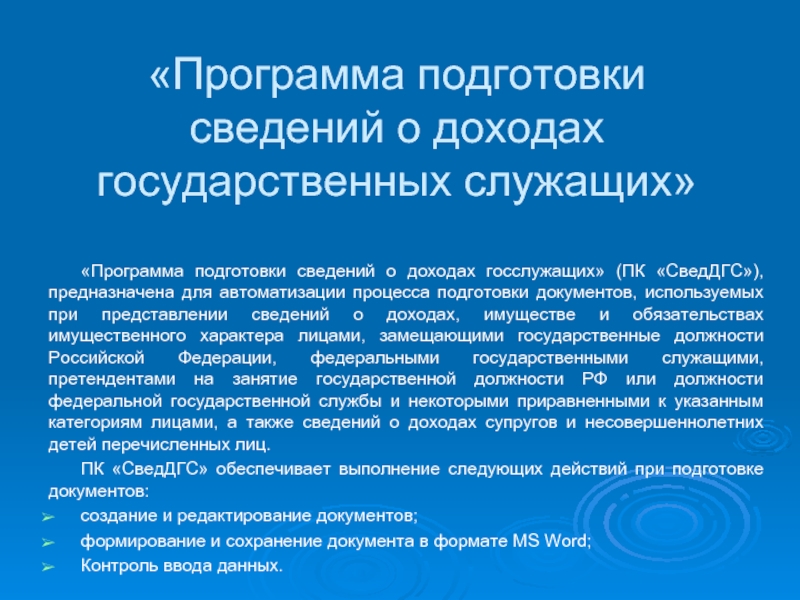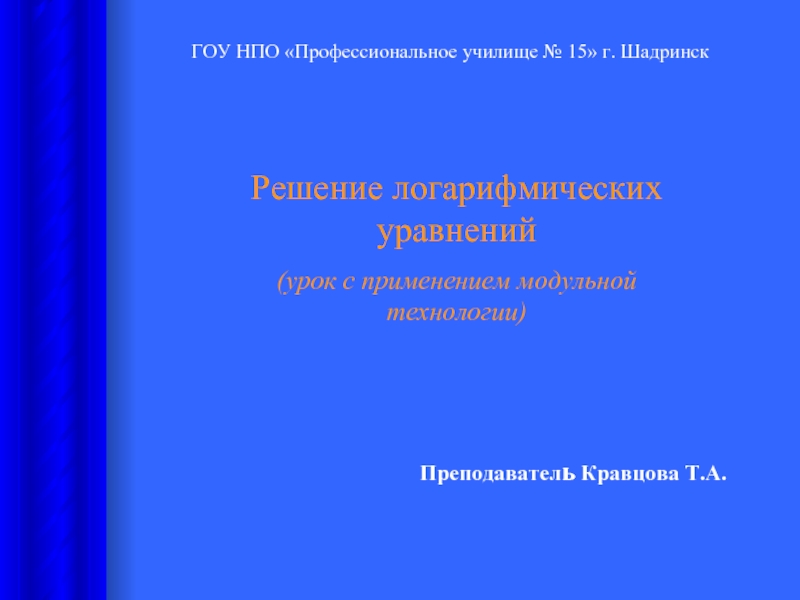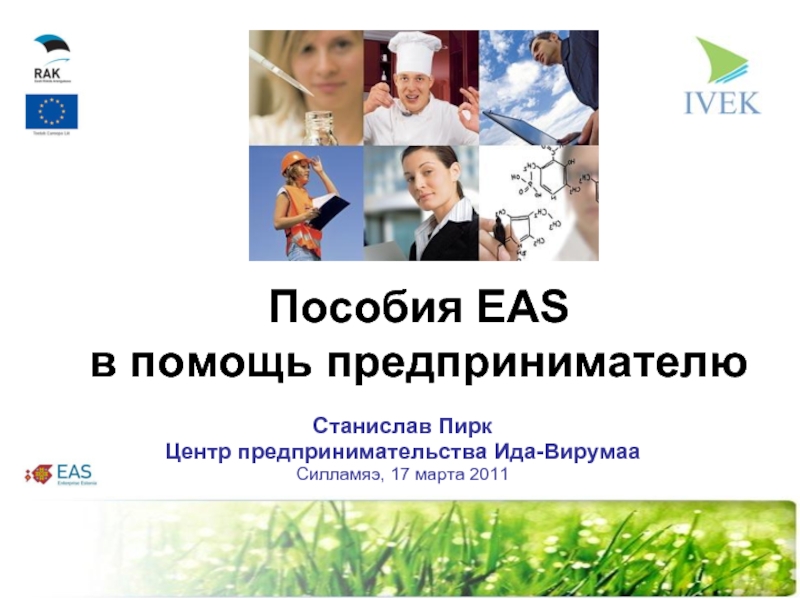- Главная
- Разное
- Дизайн
- Бизнес и предпринимательство
- Аналитика
- Образование
- Развлечения
- Красота и здоровье
- Финансы
- Государство
- Путешествия
- Спорт
- Недвижимость
- Армия
- Графика
- Культурология
- Еда и кулинария
- Лингвистика
- Английский язык
- Астрономия
- Алгебра
- Биология
- География
- Детские презентации
- Информатика
- История
- Литература
- Маркетинг
- Математика
- Медицина
- Менеджмент
- Музыка
- МХК
- Немецкий язык
- ОБЖ
- Обществознание
- Окружающий мир
- Педагогика
- Русский язык
- Технология
- Физика
- Философия
- Химия
- Шаблоны, картинки для презентаций
- Экология
- Экономика
- Юриспруденция
Спорт в нашей жизни Кривошеина Л.А. МОУ- лицей №10 г. Белгород презентация
Содержание
- 1. Спорт в нашей жизни Кривошеина Л.А. МОУ- лицей №10 г. Белгород
- 2. Read the words Ancient-древний amateur-любительский
- 3. Что такое спорт Спорт- составная часть
- 4. OLYMPIC GAMES STORY
- 5. The important thing is not winning but taking part. Pierre de Coubertin
- 6. The Ancient Olympic Games 776 B.C. - 393 A.D.
- 7. HISTORY According to historical records,
- 8. OLYMPIC TRUCE The idea of a
- 9. THE SPORTS EVENTS The ancient
- 10. DID YOU KNOW? The famous marathon
- 11. First modern Olympic Games 1896 A.D.
- 12. ATHENS 1896 Games of the I Olympiad
- 13. Test The ancient Olympic Games
- 14. The moments of the first Olympiad
- 15. Athens 6 April 1896. Opening ceremony of
- 16. Athens 1896, Games of the I Olympiad.
- 17. The Cup presented by Mr Bréal
- 18. Fencing a foil bout in the Zapeion
- 19. An athlete puts the shot in
- 20. Aristidis KONSTANTINIDIS of Greece, winner of the
- 21. German gymnast Hermann WEINGARTNER performing at the
- 22. The competitors at the start of the
- 23. View of a swimming event held in the sea
- 24. Spyridon LOUIS of Greece, winner of the
- 25. OLYMPIC SPORTS OF THE PAST Sports no
- 26. Golf Golf has been on the
- 27. Polo Polo is considered the oldest
- 28. The list of Olympic Games Olympic Summer
- 29. The list of Olympic Sports Summer sports:
- 30. Moscow Olympic Games 1980 A.D.
- 31. MOSCOW 1980 Games of the XXII Olympiad
- 32. The moments of the Moscow Olympiad
- 33. Emblem of the Moscow Olympiad Olympic Mishka – the mascot of the Olympiad
- 34. Moscow 19 July 1980. Opening ceremony, performers
- 35. Moscow 19 July 1980. Opening ceremony, the
- 36. Artistic gymnastics, men's team competition. The gold
- 37. Men's athletic, Bronislaw Malinowski of Poland in
- 38. Men's athletics, Viktor Markin of the Soviet
- 39. Men's cycling, the field rounds a bend
- 40. Nikolay ANDRIANOV from the Soviet Union in
- 41. Moscow 3 August 1980. Closing ceremony, the mascot Misha flies away.
- 42. Sochi Winter Olympic Games 2014 A.D.
- 43. SOCHI 2014 XXII Olympic Winter Games From
- 44. Unsurpassed Excellence The vision of Sochi 2014
- 45. Inspire and Energise The Sochi 2014 Games
- 46. Venues Sochi 2014 will provide the Olympic
- 47. The Vote The IOC members made their
- 48. RECOGNISED SPORTS In order to promote
- 49. The end
Слайд 2Read the words
Ancient-древний
amateur-любительский
symbol-символ
mascot- талисман
champion- чемпион
athlete- атлет
professional-профессиональный
Слайд 3Что такое спорт
Спорт- составная часть физической культуры- комплексы физических упражнений,
Sport- an individual pr group activity pursued for exercise or pleasure, often involving the testing of physical capabilities and taking the form of a competitive game such as football, tennis ets.
Слайд 7HISTORY
According to historical records, the first ancient Olympic Games were held
Слайд 8OLYMPIC TRUCE
The idea of a truce ( перемирие) symbolises the
Слайд 9
THE SPORTS EVENTS
The ancient Olympic Games were initially a one-day
Слайд 10DID YOU KNOW?
The famous marathon race did not exist in
Слайд 12ATHENS 1896
Games of the I Olympiad
The revival of the ancient
Слайд 13Test
The ancient Olympic Games were held in 776 BC
They were banned in 393 AD by Empreror Theodosius.
The ancient Olympic Games included such kinds of sports as: running, long jump, shot put, javelin, boxing, pankration and equestrian events.
First modern Olympic Games took place in Athens in 1896.
James Connolly became the 1-st Olympic champion in more than 1500 years.
241 athletes took part in this competition.
Слайд 15Athens 6 April 1896. Opening ceremony of the Games of the
Слайд 16Athens 1896, Games of the I Olympiad. View of the Pan-Athenian
stadium stand and athletics track during the 110m hurdle event
Слайд 17
The Cup presented by Mr Bréal to the marathon winner
Olympic Certificate
Слайд 18Fencing a foil bout in the Zapeion Hall
Athletics the Princeton University
Слайд 19
An athlete puts the shot in the Pan-Athenian stadium
Athletics eventual winner
Слайд 20Aristidis KONSTANTINIDIS of Greece, winner of the individual road race cycling
French compatriot cyclists Léon FLAMENG and Paul MASSON. Between them they won 6 medals in the track cycling events
Слайд 21German gymnast Hermann WEINGARTNER performing at the rings
Gymnastics eventual winner Alfred
Слайд 22The competitors at the start of the 100m event, including in
James CONNOLLY of the United States who won gold in the triple jump, silver in the high jump and bronze in the long jump
Слайд 24Spyridon LOUIS of Greece, winner of the marathon, at the medal
Men's artistic gymnastics Carl SCHUMANN of Germany performs in the horse vault event. He won the gold medal
Слайд 25OLYMPIC SPORTS OF THE PAST Sports no longer practised at the Olympic
Tug-of-war (Перетягивание каната)
Tug-of-war was on the Olympic programme in 1900, 1904, 1906 (Intercalated Games), 1908, 1912 and 1920. Tug-of-war was always contested as a part of the track and field athletics programme, although it is now considered a separate sport. The Olympic champions were as follows: 1900: a combined Swedish/Danish team; 1904: an American club team representing the Milwaukee Athletic Club; 1906: Germany/Switzerland; 1908: a British team from the City of London Police Club; 1912: Sweden; and 1920: Great Britain.
Слайд 26Golf Golf has been on the Olympic programme twice, in 1900 and
Слайд 27Polo Polo is considered the oldest mounted team sport, with a history
Lacrosse
Lacrosse was contested as a full medal sport at the 1904 and 1908 Olympics. In 1904, two Canadian teams challenged a local team from St. Louis, with the Shamrock Lacrosse Team of Winnipeg winning the gold medal. Lacrosse was also a demonstration sport at the Olympics in 1928, 1932 and 1948.
Слайд 28The list of Olympic Games
Olympic Summer Games:
Athens 1896
Paris 1900Paris 1900
St Louis 1904St
London 1908London 1908
Stockholm 1912Stockholm 1912
Antwerp 1920Antwerp 1920
Paris 1924Paris 1924
Amsterdam 1928Amsterdam 1928
Los Angeles 1932Los Angeles 1932
Berlin 1936Berlin 1936
London 1948London 1948
Helsinki 1952Helsinki 1952
Melbourne / Stockholm 1956Melbourne / Stockholm 1956
Rome 1960Rome 1960
Tokyo 1964Tokyo 1964
Mexico 1968Mexico 1968
Munich 1972Munich 1972
Montreal 1976Montreal 1976
Moscow 1980Moscow 1980
Los Angeles 1984Los Angeles 1984
Seoul 1988Seoul 1988
Barcelona 1992Barcelona 1992
Atlanta 1996Atlanta 1996
Sydney 2000Sydney 2000
Athens 2004
Olympic Winter Games:
Chamonix 1924
St. Moritz 1928
Lake Placid 1932
Garmisch-Partenkirchen 1936
St. Moritz 1948
Oslo 1952
Cortina d'Ampezzo 1956
Squaw Valley 1960
Innsbruck 1964
Grenoble 1968
Sapporo 1972
Innsbruck 1976
Lake Placid 1980
Sarajevo 1984
Calgary 1988
Albertville 1992
Lillehammer 1994
Nagano 1998
Salt Lake City 2002
Turin 2006
Слайд 29The list of Olympic Sports
Summer sports:
Aquatics
Archery
Athletics
Badminton
Baseball
Basketball
Boxing
Canoe / kayak
Cycling
Equestrian
Fencing
Football
Gymnastics
Handball
Hockey
Judo
Modern pentathlon
Rowing
Sailing
Shooting
Softball
Table tennis
Taekwondo
Tennis
Triathlon
Volleyball
Weightlifting
Wrestling
Winter sports:
Biathlon
Bobsleigh
Curling
Ice Hockey
Luge
Skating
Skiing
Слайд 31MOSCOW 1980
Games of the XXII Olympiad
A U.S.-led boycott reduced the
Gerd Wessig became the first male high jumper to break the world record at the Olympics
and swimmer Vladimir Salnikov broke the 15-minute barrier for the 1,500m. In adramatic confrontation, runners Steve Ovett and Sebastian Coe split the 800 and 1,500m.
80 NOCs (Nations)
5,179 athletes (1,115 women, 4,064 men)
203 events
5,615 media (2,685 written press, 2,930 broadcasters)
Слайд 34Moscow 19 July 1980. Opening ceremony, performers form a human pyramid
Opening
Слайд 35Moscow 19 July 1980. Opening ceremony, the flag-bearers of the different
Opening ceremony, the Head of the USSR Léonid Brejnev declares the official opening of the Games of the XXII Olympiad
Слайд 36Artistic gymnastics, men's team competition. The gold medal-winning Soviet Union team
Gerd WESSIG of the German Democratic Republic jumps for joy after winning the men's high jump competition at the Games of the XXII Olympiad
Слайд 37Men's athletic, Bronislaw Malinowski of Poland in action during the 3000m
Men's athletics, Allan Wells (right) of Great Britain on his way to victory during the 100m event
Слайд 38Men's athletics, Viktor Markin of the Soviet Union in action during
Mirtus YIFTER of Ethiopia brushes shoulders with Aleksandr FEDOTKIN of the Soviet Union on his way to victory in the 5000m at the Games of the XXII Olympiad
Слайд 39Men's cycling, the field rounds a bend during the individual road
Teofilo STEVENSON of Cuba (left) and Piotr ZAEV of the Soviet Union in action during the heavyweight boxing final bout
Слайд 40Nikolay ANDRIANOV from the Soviet Union in action during the rings
Women's artistic gymnastics, Nellie Kim of Tajikistan in the Soviet Union in action during her performance in the floor exercises
Слайд 43SOCHI 2014 XXII Olympic Winter Games From the 7th to 23rd February 2014
ELECTION
The city of Sochi will be the host city for the XXII Olympic Winter Games in 2014. Sochi was elected on 4 July 2007 by the members of the International Olympic Committee (IOC) at the 119th Session in Guatemala City. Sochi was up against the cities of PyeongChang and Salzburg, and Sochi prevailed in the second round of voting, with 51 votes against 47 votes for PyeongChang.
Слайд 44Unsurpassed Excellence
The vision of Sochi 2014 is to unite the resources
Design of the Bolshoi Ice Hockey Palace
Слайд 45Inspire and Energise
The Sochi 2014 Games will provide a new gateway
Design of the Maly Ice Hockey Palace
Слайд 46Venues
Sochi 2014 will provide the Olympic Movement with a “once-in-a-lifetime” Winter
Design of the Olympic Stadium
Слайд 47The Vote
The IOC members made their choice for 2014 based on
Results of the vote:
Round 1
Sochi: 34
Salzburg: 25
PyeongChang: 36
Round 2
Sochi: 51
PyeongChang: 47
Слайд 48RECOGNISED SPORTS
In order to promote the Olympic Movement, the International
As far as the role of the IFs within the Olympic Movement is concerned, their statutes, practice and activities must be in conformity with the Olympic Charter. Subject to the foregoing, each IF maintains its independence and autonomy in the administration of its sport.
RECOGNISED SPORTS LIST
Air sportsAir sports, BandyAir sports, Bandy, Billiard SportsAir sports, Bandy, Billiard Sports, BoulesAir sports, Bandy, Billiard Sports, Boules, BowlingAir sports, Bandy, Billiard Sports, Boules, Bowling, Bridge
ChessChess, CricketChess, Cricket, DanceSportChess, Cricket, DanceSport, GolfChess, Cricket, DanceSport, Golf, KarateChess, Cricket, DanceSport, Golf, Karate, Korfball
Life SavingLife Saving, Motorcycle RacingLife Saving, Motorcycle Racing, Mountaineering and Climbing
NetballNetball, OrienteeringNetball, Orienteering, Pelote BasqueNetball, Orienteering, Pelote Basque, PoloNetball, Orienteering, Pelote Basque, Polo, Powerboating,
RacquetballRacquetball, Roller SportsRacquetball, Roller Sports, RugbyRacquetball, Roller Sports, Rugby, Sport climbing,
SquashSquash, SurfingSquash, Surfing, SumoSquash, Surfing, Sumo, Tug of WarSquash, Surfing, Sumo, Tug of War, Underwater Sports,
Water SkiingWater Skiing, Wushu

